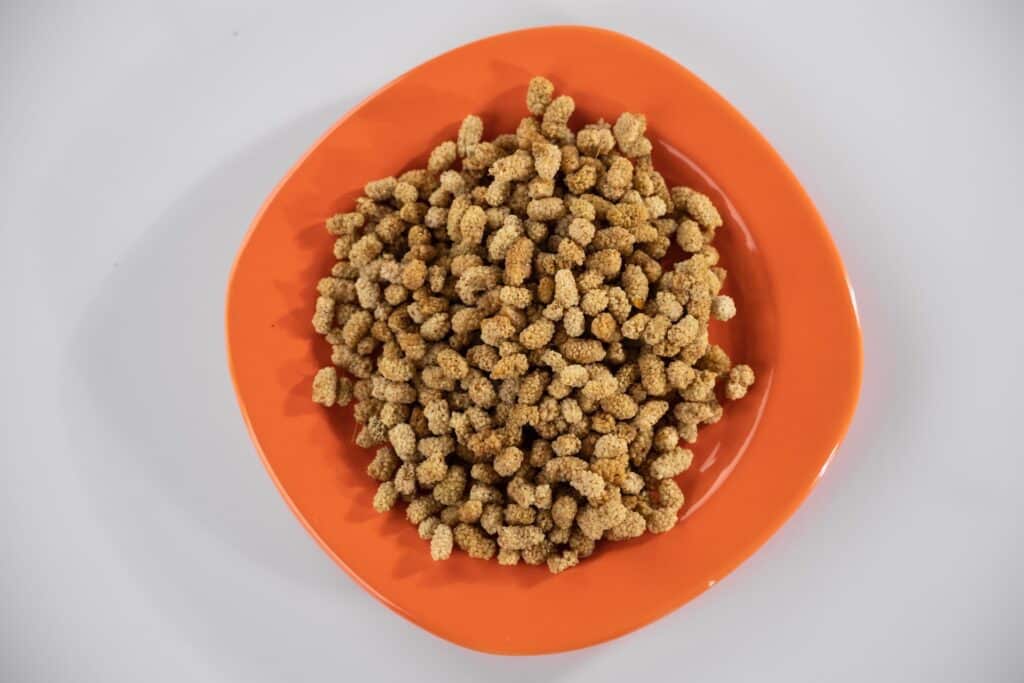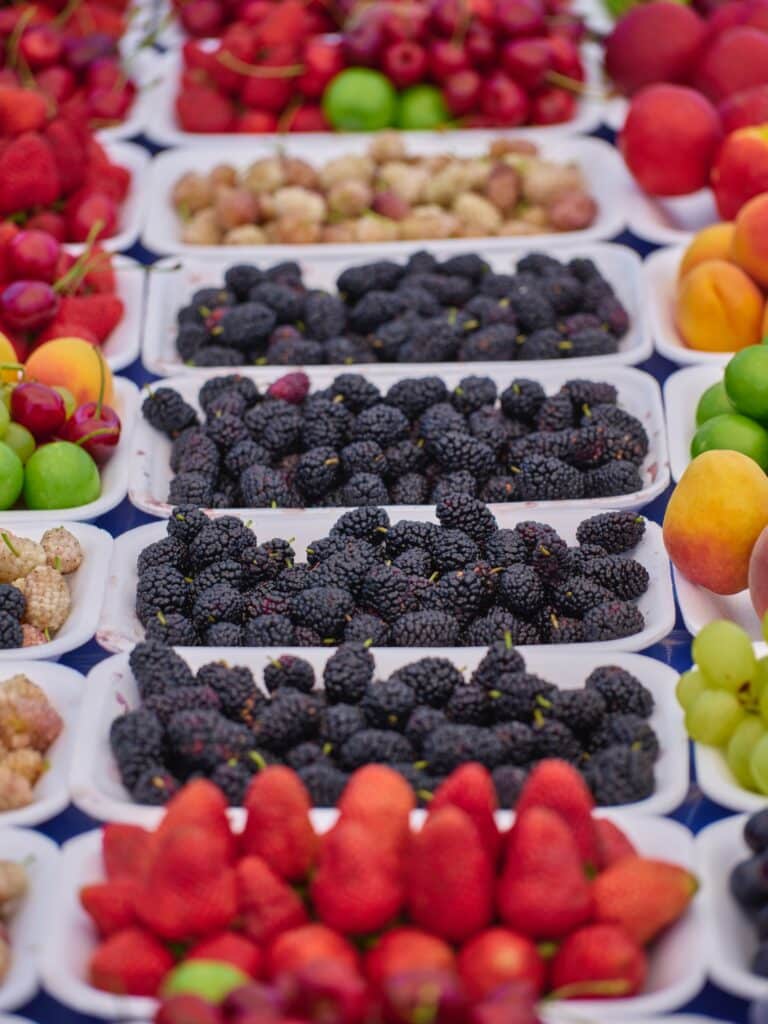Mulberries may be present everywhere, depending on where you live. They establish themselves in the yard and grow into bushes that can quickly engulf entire garden corners. How are you supposed to control your dog when they are outside and wants a quick snack if you can’t control the growth?
Knowing whether mulberries are harmful to your dog is important because they are one of the more popular berries. Can dogs eat mulberries? Yes, basically, but with some limitations. Continue reading to find out more about the safety of this berry and a few others that you may want to keep an eye out for if you see your dog prowling in their direction.
Table of Contents
Related : Can dogs eat bacon? Is Bacon Bad for Dogs? How much bacon should a dog eat?

Can dogs eat mulberries?
Black, white, and red ripe mulberries, as well as other varieties, can all be safely added in small amounts to a dog’s diet. Now and then, a couple of ripe mulberries make a tasty, low-calorie treat for dogs. Rich in vitamins and minerals, ripe berries have many potential health advantages.
Mulberries that are still in the bud should not be given to your dog because they can cause hallucinations. Mulberries should only be used as a small supplement to your dog’s diet because any human food can upset a dog’s delicate stomach.
Always seek the advice of a veterinarian before including human food in a dog’s diet. It’s important to remember that a dog should get 90% of its calories from dog food, and the other 10% occasionally from human foods. In addition, pet owners should be careful not to confuse mulberries with harmful berries like juniper berries and mistletoe berries.

Can dogs eat dried mulberries?
The nutritional value of dried mulberries is poor, even though it is safe for dogs to eat them. Due to dried mulberries’ higher calorie and sugar content, your pet will consume more sugar than necessary. Obesity, heart disease, and diabetes are more likely in dogs who consume too many calories and/or sugar.
Can dogs eat white mulberries?
The white mulberry tree, also known as Morus alba, is native to China. The berries are either white or barely green, and they are the main food source for silkworms. Your dog can eat these white or green berries without any problems. Simply be cautious and give them a little at a time.
Can dogs eat red mulberries?
Yes, dogs can eat red mulberries with no problems. The same health risks apply to them as to blackberries. Additionally, they contain a lot of insoluble fiber, which, if consumed in excess by your dog, may result in digestive issues. Additionally, your pet will benefit from it. Antioxidants, which fight free radicals, are abundant in them. Additionally, these berries boost the creation of red blood cells.

Can dogs eat black mulberries?
The black mulberry tree, which is also native to China, yields berries that are so safe to consume that they have been used for medicinal purposes for hundreds of years. The best time for dogs to eat a few is from the middle of August to the beginning of September when they will fall from the branch when ripe.
Are mulberries good for dogs?
Mulberries have a huge amount of nutrients. They contain resveratrol, an antioxidant that fights age, as well as high levels of dietary fiber, iron that helps oxygen circulate, vitamins for bone and brain health, and cancer-preventing anthocyanins.
Compared to the majority of fruits, some of which require a lot more work to prepare safely for your dog, this offers a lot more nutritional value. In our opinion, this makes mulberries a superfruit for canines. Dietary fiber, iron, and anthocyanins all have significant advantages in this situation. Both the improved blood circulation brought on by iron consumption and the gut health of your dog is essential. Additionally, it’s always a huge plus to stop tumors from getting into your pet’s digestive system.
Mulberries are also made up of 80% water, which will keep your dog well-hydrated. Because they contain significantly less sugar than other fruits, you can also give these a little more freely.
5 Mulberries’ Health Benefits for Dogs
The following are some potential advantages of mulberries for dogs’ health:
- Improvements to digestive health: The fiber in mulberries can help control a dog’s bowel movements and may enhance overall digestion. Mulberries also contain anthocyanins, which may shield a dog’s GI tract from developing tumors.
- Red blood cell production, blood vessel health, and improved blood circulation may all be improved by the iron in fresh mulberries.
- Improved brain function: Mulberries may protect and enhance the processes by which brain cells heal, preventing brain aging and aiding in dog learning.
- Strong bones: Mulberries’ vitamins and minerals support strong bones, which may lower your dog’s risk of injury and hasten the healing of broken bones.
- Vitamins and antioxidants: Mulberries are a good source of vitamins (like vitamin C and vitamin K) that improve your dog’s health and overall immune system function, as well as antioxidants that defend against heart disease and fight free radicals.
Are mulberries bad for dogs?
No, mulberries are safe for canines. If they eat too much, the only risk is an upset stomach. Berries contain a lot of fiber, so if they consume too many of them, they will likely experience frequent loose stools. Simply keep an eye on them and provide them with lots of water if you notice your furry friend is experiencing digestive problems after eating fresh mulberries.
The answer to the question “Are mulberries poisonous to dogs?” The answer is no, dogs are not poisoned by anything about this plant. Mulberry trees are safe for dogs to be around, according to the ASPCA. When you introduce new foods to your canine companions, keep an eye out for symptoms of an allergic reaction or stomach upset. Giving them small amounts at once is the best way to avoid side effects.
Canine toxic berries
When out for a walk or just exploring the yard, your dog can access a variety of other common berries besides mulberries. Some berries are dangerously toxic for dogs, so not all of them are good for them. If your dog enjoys eating mulberries, it may be more likely to consume a berry directly from the plant. If you let your dog out alone, keep an eye out for these poisonous berries or remove them from your yard.
Toxic Berries for Dogs
- Juniper berries
- Pokeberries
- Baneberries
- Holly berries
- Cherries
- Mistletoe berries
How can I safely give mulberries to my dog?
Mulberries only need to be washed as their only preparation. On the exterior of fruits, harmful pesticides can occasionally be found. In general, washing anything you or your dog intend to eat is a good idea. One more thing to remember is to make sure your mulberries are ripe. This is crucial for both you and your dog.
Unripe mulberries can seriously upset your stomach and give you hallucinations. Yes, both people and animals have experienced hallucinations as a result of unripe mulberries. The substances that cause this are chemically removed by ripe mulberries. You are permitted to enjoy yourself with mulberries aside from those two things. Simply don’t give your dog dried mulberries. Dried fruits typically contain large amounts of sugar.
Start your puppy off with a small number of berries to see how they respond, and then watch them for a few hours to make sure they don’t experience any allergic reactions. This is highly unlikely in small amounts given the water content of these berries. But if something does happen, it probably won’t last long. Always consult your veterinarian about any unusual events involving a new food. Early detection is always preferable because sometimes these can be indications of something more problematic.
Final Thoughts
Can dogs eat mulberries? It’s okay for dogs to eat mulberries. However, you shouldn’t let your dog eat too many mulberries because doing so can cause an upset stomach. The secret to utilizing the wealth of nutritional advantages that this fruit has to offer is moderation. When giving your dog food for the first time, keep an eye out for allergies as well. We hope that this article has satisfactorily answered your query.
References: